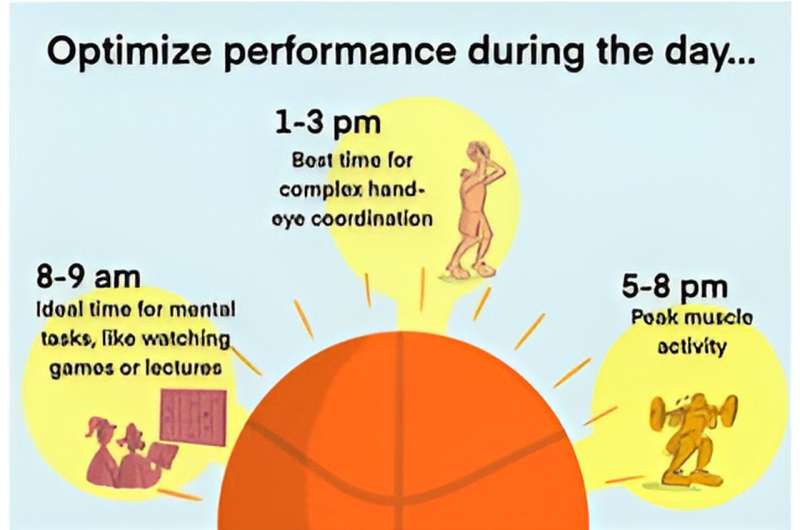This article has been reviewed according to Science X's editorial process and policies. Editors have highlighted the following attributes while ensuring the content's credibility:
fact-checked
trusted source
proofread
East-West travel has negative impacts on student-athletes through sleep and circadian disruption, say researchers

Announcements in June 2022 of possible realignments of major east-west athletic conferences raised concern among many sleep and circadian physicians and scientists across the United States. As a result of such changes, student-athletes would suffer the negative consequences of increased travel—especially with travel that crosses time zones and induces jet lag.
Because of the concern over the demise of the Pac12, leading to more east-west trips, a group of sleep and circadian scientists and physicians have published a white paper describing the significance of repeated, chronic jet lag on student-athlete health and performance—both in academics and in sports. They also suggest strategies that can be used to reduce the consequences of travel across time zones.
The research, "The Negative Effects of Travel on Student Athletes Through Sleep and Circadian Disruption," was published in the Journal of Biological Rhythms.
Travel is essential in collegiate athletic programs, and it inevitably results in disruptions of academic work, poor sleep, and alterations in most other aspects of student life. But all travel is not the same, explains Stanford Professor Craig Heller.
"Our bodies consist of a myriad of biological processes that are coordinated by a central clock in the brain," Dr. Heller explained. "That clock has its own daily rhythm that is correlated with home time, but that internal rhythm is not exactly 24 hours. The brain clock and the processes it times are therefore called circadian (circa=about, dia=day)."
Dr. Heller explains that when people cross time zones, the brain's circadian clock stays on "home" time until it can be resynchronized to local time. During this resynchronization process, different body systems can lose their coordination with each other and with local time. "Therefore, crossing time zones disrupts the alignment of body functions and their ability to function optimally," he said.
Jet lag causes poor, short, fragmented sleep, altered digestive functions, weakened emotional control, and compromised physical and cognitive performance. For each time zone crossed, the realignment of body functions with local time takes about a day. If the stay in the new location is long enough to enable complete realignment with local time, there will be a repeat of jet lag after the return home. Importantly, repeatedly crossing time zones every week or two results in chronic jet lag, which can have significant impacts on the lives of the student-athletes.
In addition to the imposition of jet lag on the student-athletes, competitions between teams from different time zones raise scheduling issues. Different aspects of performance are optimal at different times of day, and therefore at different circadian times.
Professor Horacio de la Iglesia from University of Washington, a co-author of the paper and President of the Society for Research on Biological Rhythms, explains "Cognitive abilities are best in the morning hours, complex hand-eye coordination in early afternoon, and peak muscle performance in late afternoon-early evening. Therefore, the scheduling of events can favor one or the other team."
An obvious example is that an east coast team traveling to the west coast for an evening game time would be competing when their circadian rhythms are set for sleep. Similarly, a west coast team traveling to the east coast would be sleep deprived due to short/disrupted sleep during travel. More important than winning or losing, injuries are more likely when not competing at the optimal circadian time.
Athletic conference agreements involve more than the financial considerations of resulting media contracts. There are significant costs to the student-athletes. If increased east-west travel is inevitable, then there should be major efforts to mitigate jet lag consequences and create event schedules that minimize the circadian differentials between the teams.
The authors recommend methods to lessen the impact of jet lag. These methods include preadaptation for several days before travel. Alternatively, allowing sufficient time in the new location to allow circadian adjustment is beneficial, but difficult because it extends trip duration.
Both before and after travel, management of exposure to light is important as are a variety of methods to facilitate good sleep. Athletic department consultations with local sleep and circadian experts are advisable. Longitudinal collection of data on travel along with physical and mental health, and academic and athletic performance of student athletes will be of value in assessing and minimizing the impact of conference realignments on our student-athletes.
More information: H. Craig Heller et al, The Negative Effects of Travel on Student Athletes Through Sleep and Circadian Disruption, Journal of Biological Rhythms (2023). DOI: 10.1177/07487304231207330





















